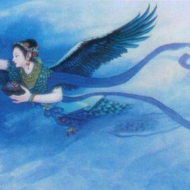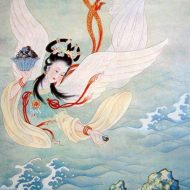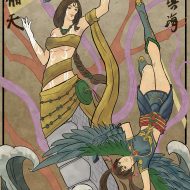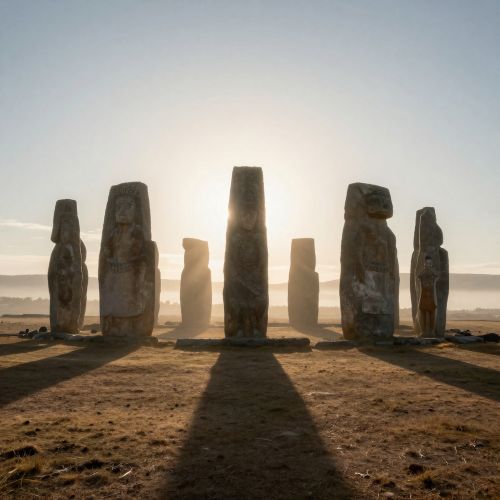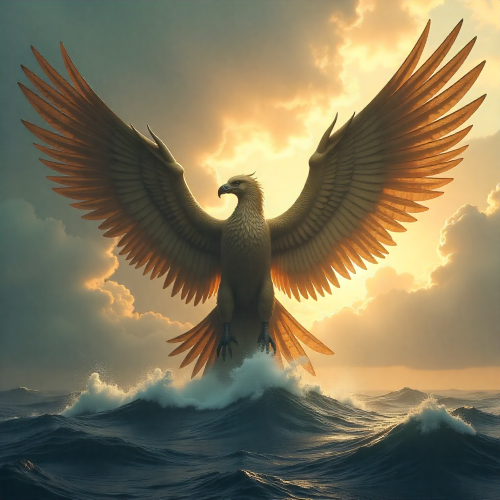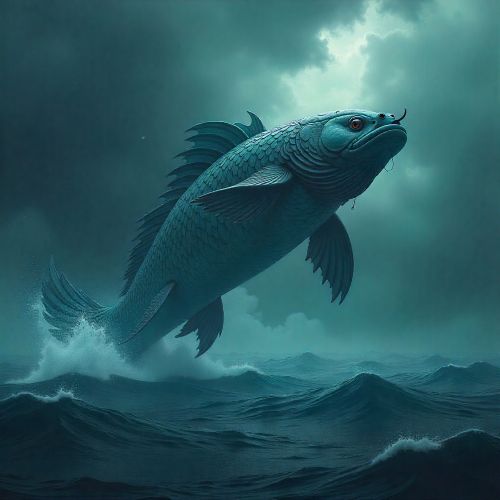Jingwei : The Tragic Bird
| Description | |
|---|---|
| Origin | Chinese Mythology |
| Classification | Animals |
| Family Members | Yang Di (Father) |
| Region | China |
| Associated With | Sea, Revenge |
Introduction
Jingwei is one of the most enduring figures in Chinese mythology, remembered as a symbol of perseverance and defiance against fate. She was the young daughter of Emperor Yan, also known as Yandi, who drowned tragically in the Eastern Sea. Rather than disappearing into obscurity, her spirit transformed into a small bird with a burning resolve, vowing to fill the vast sea with twigs and stones to avenge her untimely death.
The legend of Jingwei has resonated with generations, embodying the idea that even in the face of impossible odds, the will to persist carries great meaning. Her story reflects the values of resilience and determination that remain deeply ingrained in Chinese culture, showing that no effort is ever truly wasted, no matter how small it seems.
Physical Traits
In her transformed state, Jingwei became a striking bird unlike any other. Ancient texts describe her as having the head of a delicate flower, a sharp white beak resembling a seashell, and bright red claws that gleamed against her feathers. Though small, her appearance carried an aura of defiance and beauty, making her instantly recognizable in the folklore of China. The details of her physical form emphasize her dual nature as both a fragile young girl and a fierce spirit of perseverance.
Family
Jingwei’s human identity was that of Nüwa, the cherished daughter of Emperor Yan, one of the legendary rulers of ancient China. Yandi was known for his deep connection with nature, particularly the sun and the Eastern Sea, where he often sought medicinal resources and guidance. Young Nüwa longed to join her father on his journeys, yearning to see the rising sun over the sea.
On one fateful day, while her father was away, she set out alone to the Eastern Sea. However, a sudden storm capsized her small boat, and the relentless waves claimed her life. Despite Emperor Yan’s vast knowledge of herbs and healing, he could not bring his daughter back. The grief of this tragedy gave birth to her transformation into the immortal bird, Jingwei.
Powers and Abilities
Jingwei’s power lies not in physical strength but in her extraordinary willpower. After her transformation, she dedicated herself to filling the Eastern Sea so that no one else would perish as she did. Day after day, she carries pebbles and twigs in her beak, dropping them into the boundless waters.
Though the sea mocks her, saying it would take millions of years to succeed, Jingwei replies with even greater resolve—promising to spend ten million years if necessary to complete her task. Her defiance and endurance highlight her role as a guardian figure, determined to reshape destiny through persistence alone.
Modern Day Influence
The myth of Jingwei continues to inspire Chinese culture, art, and language. The story embodies themes of rebirth and transformation, where tragedy gives rise to purpose—a common motif in Chinese mythology. From her tale, the chengyu (four-character idiom) “Jingwei Tries to Fill the Sea” (精卫填海) was born, symbolizing unwavering determination despite impossible odds.
Beyond traditional storytelling, Jingwei has also found a place in modern pop culture. She appears as a playable character in the MMORPG Smite, keeping her legend alive for global audiences. Her story remains a reminder that persistence, no matter how futile it may appear, has the power to inspire courage and endurance in every generation.
Related Images
Sources
Strassberg, R. E. (2002). A Chinese Bestiary: Strange Creatures from the Guideways Through Mountains and Seas. University of California Press. Retrieved from https://en.wikipedia.org/wiki/Jingwei
Yang, L., & An, D. (2005). Handbook of Chinese Mythology. ABC-CLIO. Retrieved from https://en.wikipedia.org/wiki/Jingwei
Wikipedia contributors. (2025, September). Jingwei. In Wikipedia. Retrieved September 9, 2025, from https://en.wikipedia.org/wiki/Jingwei
Shanhaijing (Classic of Mountains and Seas). Primary text reference for the Jingwei myth. Retrieved from https://en.wikipedia.org/wiki/Jingwei
Indrachapa. (2017). The Legend of Jingwei – The Tale of the Princess Who Sailed Out Alone. Steemit. Retrieved from https://steemit.com/legend/@indrachapa/the-legend-of-jing-wei-the-tale-of-the-princess-who-sailed-out-alone
Mythlok. (n.d.). Jingwei: The Tragic Bird in Chinese Mythology. Mythlok. Retrieved from https://mythlok.com/jingwei/
Made-in-China.com. (2015). Myth of Jingwei Filling the Sea. Made-in-China Resources. Retrieved from https://resources.made-in-china.com/article/culture-life/KQtnkOsGOmIi/Myth-of-Jingwei-Filling-the-Sea/
Dartmouth Folklore Archive. (2017). Jingwei. Dartmouth Journeys Folklore Archive. Retrieved from https://journeys.dartmouth.edu/folklorearchive/jingwei/
Frequently Asked Questions
What does Jingwei mean in Chinese?
In Chinese, Jingwei (精卫) is the name of a mythical bird in ancient folklore. The word literally means “Spirit Guardian” or “Vigilant Spirit.” It symbolizes perseverance, as the bird tirelessly tries to fill the sea with twigs and stones.
What is Jingwei the goddess of?
Jingwei is not a full goddess but a mythical bird-spirit in Chinese mythology. She is associated with perseverance, determination, and the struggle against impossible odds. Her legend comes from the tale of Emperor Yan’s drowned daughter who transformed into the bird.
Why do Chinese people admire the Jingwei bird?
Chinese people admire the Jingwei bird because it symbolizes unyielding determination and resilience. Despite knowing it cannot fill the vast sea, Jingwei continues her task without giving up. This persistence reflects the cultural value of endurance in the face of hardship.
What is the Jingwei myth?
The Jingwei myth tells of Nüwa, the daughter of Emperor Yan, who drowned in the Eastern Sea. After her death, she transformed into a small bird called Jingwei. Filled with sorrow and determination, she began carrying twigs and stones to fill the sea so no one else would suffer her fate.
What lesson does the Jingwei story teach?
The story of Jingwei teaches the value of perseverance and courage, showing that even when facing impossible challenges, persistence and determination can inspire strength and hope.


